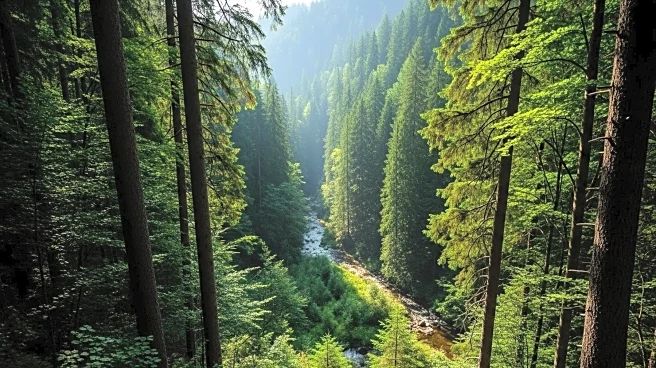What's Happening?
The Trump administration has initiated steps to rescind the Roadless Rule, a regulation established in 2001 that protects 58.5 million acres of wild areas in national forests, including 4.4 million acres in California. The United States Department of Agriculture (USDA) announced the publication of a notice of intent to roll back the rule, which will start a 21-day public comment period. The Roadless Rule was designed to prevent road construction and logging in specified wilderness areas, aiming to protect habitats and reduce erosion and pollution. The rescission aligns with the administration's broader efforts to loosen environmental regulations, including expanding timber cutting and repealing rules on emissions and pollution.
Why It's Important?
The rescission of the Roadless Rule could have significant environmental impacts, as it opens up protected forest areas to potential logging and development. Environmental groups have expressed concern that this move could endanger wildlife habitats and affect water quality. The rule has been crucial in preserving biodiversity and providing safe havens for endangered species. Economically, the rollback is seen as a way to boost timber production and manage fire risks, potentially benefiting rural communities reliant on these industries. However, it also raises concerns about long-term sustainability and the preservation of natural resources.
What's Next?
The USDA's proposal will undergo a public comment period until September 19, allowing stakeholders and the public to express their views. Environmental groups are expected to mobilize opposition, advocating for the protection of these forest areas. The rescission does not apply to Colorado and Idaho, which have state-specific roadless rules. The outcome of the public comment period and subsequent actions by the USDA will determine the future management of these lands. Legal challenges and advocacy efforts may arise as stakeholders seek to influence the decision-making process.
Beyond the Headlines
The rollback of the Roadless Rule highlights broader debates about federal land management and environmental policy. It raises ethical questions about balancing economic growth with conservation efforts. The decision could set a precedent for future actions regarding protected lands and environmental regulations. The move also reflects ideological shifts in how public lands are valued and managed, potentially influencing policy decisions beyond the current administration.











